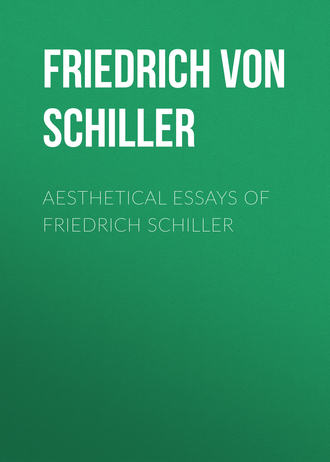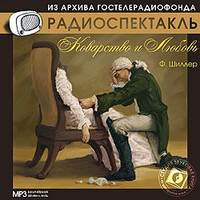 полная версия
полная версияAesthetical Essays of Friedrich Schiller
But would the action have continued moral in both cases, if we suppose the aesthetic taste to have taken part in it? For example, suppose that the first, who was tempted to commit a bad action, and who gave it up from respect for justice, had the taste sufficiently cultivated to feel an invincible horror aroused in him against all disgraceful or violent action, the aesthetic sense alone will suffice to turn him from it; there is no longer any deliberation before the moral tribunal, before the conscience; another motive, another jurisdiction has already pronounced. But the aesthetic sense governs the will by the feeling and not by laws. Thus this man refuses to enjoy the agreeable sensation of a life saved, because he cannot support his odious feelings of having committed a baseness. Therefore all, in this, took place before the feelings alone, and the conduct of this man, although in conformity with the law, is morally indifferent; it is simply a fine effect of nature.
Now let us suppose that the second, he to whom his reason prescribed to do a thing against which natural instinct protested; suppose that this man had to the same extent a susceptibility for the beautiful, so that all which is great and perfect enraptured him; at the same moment, when reason gave the order, the feelings would place themselves on the same side, and he would do willingly that which without the inclination for the beautiful he would have had to do contrary to inclination. But would this be a reason for us to find it less perfect? Assuredly not, because in principle it acts out of pure respect for the prescriptions of reason; and if it follows these injunctions with joy, that can take nothing away from the moral purity of the act. Thus, this man will be quite as perfect in the moral sense; and, on the contrary, he will be incomparably more perfect in the physical sense, because he is infinitely more capable of making a virtuous subject.
Thus, taste gives a direction to the soul which disposes it to virtue, in keeping away such inclinations as are contrary to it, and in rousing those which are favorable. Taste could not injure true virtue, although in every case where natural instinct speaks first, taste commences by deciding for its chief that which conscience otherwise ought to have known; in consequence it is the cause that, amongst the actions of those whom it governs, there are many more actions morally indifferent than actions truly moral. It thus happens that the excellency of the man does not consist in the least degree in producing a larger sum of vigorously moral particular actions, but by evincing as a whole a greater conformity of all his natural dispositions with the moral law; and it is not a thing to give people a very high idea of their country or of their age to hear morality so often spoken of and particular acts boasted of as traits of virtue. Let us hope that the day when civilization shall have consummated its work (if we can realize this term in the mind) there will no longer be any question of this. But, on the other side, taste can become of possible utility to true virtue, in all cases when, the first instigations issuing from reason, its voice incurs the risk of being stifled by the more powerful solicitations of natural instinct. Thus, taste determines our feelings to take the part of duty, and in this manner renders a mediocre moral force of will sufficient for the practice of virtue.
In this light, if the taste never injures true morality, and if in many cases it is of evident use – and this circumstance is very important – then it is supremely favorable to the legality of our conduct. Suppose that aesthetic education contributes in no degree to the improvement of our feelings, at least it renders us better able to act, although without true moral disposition, as we should have acted if our soul had been truly moral. Therefore, it is quite true that, before the tribunal of the conscience, our acts have absolutely no importance but as the expression of our feelings: but it is precisely the contrary in the physical order and in the plan of nature: there it is no longer our sentiments that are of importance; they are only important so far as they give occasion to acts which conduce to the aims of nature. But the physical order which is governed by forces, and the moral order which governs itself by laws, are so exactly made one for the other, and are so intimately blended, that the actions which are by their form morally suitable, necessarily contain also a physical suitability; and as the entire edifice of nature seems to exist only to render possible the highest of all aims, which is the good, in the same manner the good can in its turn be employed as the means of preserving the edifice. Thus, the natural order has been rendered dependent upon the morality of our souls, and we cannot go against the moral laws of the world without at the same time provoking a perturbation in the physical world.
If, then, it is impossible to expect that human nature, as long as it is only human nature, should act without interruption or feebleness, uniformly and constantly as pure reason, and that it never offend the laws of moral order; if fully persuaded, as we are, both of the necessity and the possibility of pure virtue, we are forced to avow how subject to accident is the exercise of it, and how little we ought to reckon upon the steadfastness of our best principles; if with this conviction of human fragility we bear in mind that each of the infractions of the moral law attacks the edifice of nature, if we recall all these considerations to our memory, it would be assuredly the most criminal boldness to place the interests of the entire world at the mercy of the uncertainty of our virtue. Let us rather draw from it the following conclusion, that it is for us an obligation to satisfy at the very least the physical order by the object of our acts, even when we do not satisfy the exigencies of the moral order by the form of these acts; to pay, at least, as perfect instruments the aims of nature, that which we owe as imperfect persons to reason, in order not to appear shamefaced before both tribunals. For if we refused to make any effort to conform our acts to it because simple legality is without moral merit, the order of the world might in the meanwhile be dissolved, and before we had succeeded in establishing our principles all the links of society might be broken. No, the more our morality is subjected to chance, the more is it necessary to take measures in order to assure its legality; to neglect, either from levity or pride, this legality is a fault for which we shall have to answer before morality. When a maniac believes himself threatened with a fit of madness, he leaves no knife within reach of his hands, and he puts himself under constraint, in order to avoid responsibility in a state of sanity for the crimes which his troubled brain might lead him to commit. In a similar manner it is an obligation for us to seek the salutary bonds which religion and the aesthetic laws present to us, in order that during the crisis when our passion is dominant it shall not injure the physical order.
It is not unintentionally that I have placed religion and taste in one and the same class; the reason is that both one and the other have the merit, similar in effect, although dissimilar in principle and in value, to take the place of virtue properly so called, and to assure legality where there is no possibility to hope for morality. Doubtless that would hold an incontestably higher rank in the order of pure spirits, as they would need neither the attraction of the beautiful nor the perspective of eternal life, to conform on every occasion to the demands of reason; but we know man is short-sighted, and his feebleness forces the most rigid moralist to temper in some degree the rigidity of his system in practice, although he will yield nothing in theory; it obliges him, in order to insure the welfare of the human race, which would be ill protected by a virtue subjected to chance, to have further recourse to two strong anchors – those of religion and taste.
ON THE SUBLIME
"Man is never obliged to say, I must – must," says the Jew Nathan [Lessing's play, "Nathan the Wise," act i. scene 3.] to the dervish; and this expression is true in a wider sense than man might be tempted to suppose. The will is the specific character of man, and reason itself is only the eternal rule of his will. All nature acts reasonably; all our prerogative is to act reasonably, with consciousness and with will. All other objects obey necessity; man is the being who wills.
It is exactly for this reason that there is nothing more inconsistent with the dignity of man than to suffer violence, for violence effaces him. He who does violence to us disputes nothing less than our humanity; he who submits in a cowardly spirit to the violence abdicates his quality of man. But this pretension to remain absolutely free from all that is violence seems to imply a being in possession of a force sufficiently great to keep off all other forces. But if this pretension is found in a being who, in the order of forces, cannot claim the first rank, the result is an unfortunate contradiction between his instinct and his power.
Man is precisely in this case. Surrounded by numberless forces, which are all superior to him and hold sway over him, he aspires by his nature not to have to suffer any injury at their hands. It is true that by his intelligence he adds artificially to his natural forces, and that up to a certain point he actually succeeds in reigning physically over everything that is physical. The proverb says, "there is a remedy for everything except death;" but this exception, if it is one in the strictest acceptation of the term, would suffice to entirely ruin the very idea of our nature. Never will man be the cause that wills, if there is a case, a single case, in which, with or without his consent, he is forced to what he does not wish. This single terrible exception, to be or to do what is necessary and not what he wishes, this idea will pursue him as a phantom; and as we see in fact among the greater part of men, it will give him up a prey to the blind terrors of imagination. His boasted liberty is nothing, if there is a single point where he is under constraint and bound. It is education that must give back liberty to man, and help him to complete the whole idea of his nature. It ought, therefore, to make him capable of making his will prevail, for, I repeat it, man is the being who wills.
It is possible to reach this end in two ways: either really, by opposing force to force, by commanding nature, as nature yourself; or by the idea, issuing from nature, and by thus destroying in relation to self the very idea of violence. All that helps man really to hold sway over nature is what is styled physical education. Man cultivates his understanding and develops his physical force, either to convert the forces of nature, according to their proper laws, into the instruments of his will, or to secure himself against their effects when he cannot direct them. But the forces of nature can only be directed or turned aside up to a certain point; beyond that point they withdraw from the influence of man and place him under theirs.
Thus beyond the point in question his freedom would be lost, were he only susceptible of physical education. But he must be man in the full sense of the term, and consequently he must have nothing to endure, in any case, contrary to his will. Accordingly, when he can no longer oppose to the physical forces any proportional physical force, only one resource remains to him to avoid suffering any violence: that is, to cause to cease entirely that relation which is so fatal to him. It is, in short, to annihilate as an idea the violence he is obliged to suffer in fact. The education that fits man for this is called moral education.
The man fashioned by moral education, and he only, is entirely free. He is either superior to nature as a power, or he is in harmony with her. None of the actions that she brings to bear upon him is violence, for before reaching him it has become an act of his own will, and dynamic nature could never touch him, because he spontaneously keeps away from all to which she can reach. But to attain to this state of mind, which morality designates as resignation to necessary things, and religion styles absolute submission to the counsels of Providence, to reach this by an effort of his free will and with reflection, a certain clearness is required in thought, and a certain energy in the will, superior to what man commonly possesses in active life. Happily for him, man finds here not only in his rational nature a moral aptitude that can be developed by the understanding, but also in his reasonable and sensible nature – that is, in his human nature – an aesthetic tendency which seems to have been placed there expressly: a faculty awakens of itself in the presence of certain sensuous objects, and which, after our feelings are purified, can be cultivated to such a point as to become a powerful ideal development. This aptitude, I grant, is idealistic in its principle and in its essence, but one which even the realist allows to be seen clearly enough in his conduct, though he does not acknowledge this in theory. I am now about to discuss this faculty.
I admit that the sense of the beautiful, when it is developed by culture, suffices of itself even to make us, in a certain sense, independent of nature as far as it is a force. A mind that has ennobled itself sufficiently to be more sensible of the form than of the matter of things, contains in itself a plenitude of existence that nothing could make it lose, especially as it does not trouble itself about the possession of the things in question, and finds a very liberal pleasure in the mere contemplation of the phenomenon. As this mind has no want to appropriate the objects in the midst of which it lives, it has no fear of being deprived of them. But it is nevertheless necessary that these phenomena should have a body, through which they manifest themselves; and, consequently, as long as we feel the want even only of finding a beautiful appearance or a beautiful phenomenon, this want implies that of the existence of certain objects; and it follows that our satisfaction still depends on nature, considered as a force, because it is nature who disposes of all existence in a sovereign manner. It is a different thing, in fact, to feel in yourself the want of objects endowed with beauty and goodness, or simply to require that the objects which surround us are good and beautiful. This last desire is compatible with the most perfect freedom of the soul; but it is not so with the other. We are entitled to require that the object before us should be beautiful and good, but we can only wish that the beautiful and the good should be realized objectively before us. Now the disposition of mind is, par excellence, called grand and sublime, in which no attention is given to the question of knowing if the beautiful, the good, and the perfect exist; but when it is rigorously required that that which exists should be good, beautiful and perfect, this character of mind is called sublime, because it contains in it positively all the characteristics of a fine mind without sharing its negative features. A sign by which beautiful and good minds, but having weaknesses, are recognized, is the aspiring always to find their moral ideal realized in the world of facts, and their being painfully affected by all that places an obstacle to it. A mind thus constituted is reduced to a sad state of dependence in relation to chance, and it may always be predicted of it, without fear of deception, that it will give too large a share to the matter in moral and aesthetical things, and that it will not sustain the more critical trials of character and taste. Moral imperfections ought not to be to us a cause of suffering and of pain: suffering and pain bespeak rather an ungratified wish than an unsatisfied moral want. An unsatisfied moral want ought to be accompanied by a more manly feeling, and fortify our mind and confirm it in its energy rather than make us unhappy and pusillanimous.
Nature has given to us two genii as companions in our life in this lower world. The one, amiable and of good companionship, shortens the troubles of the journey by the gayety of its plays. It makes the chains of necessity light to us, and leads us amidst joy and laughter, to the most perilous spots, where we must act as pure spirits and strip ourselves of all that is body, on the knowledge of the true and the practice of duty. Once when we are there, it abandons us, for its realm is limited to the world of sense; its earthly wings could not carry it beyond. But at this moment the other companion steps upon the stage, silent and grave, and with his powerful arm carries us beyond the precipice that made us giddy.
In the former of these genii we recognize the feeling of the beautiful, in the other the feeling of the sublime. No doubt the beautiful itself is already an expression of liberty. This liberty is not the kind that raises us above the power of nature, and that sets us free from all bodily influence, but it is only the liberty which we enjoy as men, without issuing from the limits of nature. In the presence of beauty we feel ourselves free, because the sensuous instincts are in harmony with the laws of reason. In presence of the sublime we feel ourselves sublime, because the sensuous instincts have no influence over the jurisdiction of reason, because it is then the pure spirit that acts in us as if it were not absolutely subject to any other laws than its own.
The feeling of the sublime is a mixed feeling. It is at once a painful state, which in its paroxysm is manifested by a kind of shudder, and a joyous state, that may rise to rapture, and which, without being properly a pleasure, is greatly preferred to every kind of pleasure by delicate souls. This union of two contrary sensations in one and the same feeling proves in a peremptory manner our moral independence. For as it is absolutely impossible that the same object should be with us in two opposite relations, it follows that it is we ourselves who sustain two different relations with the object. It follows that these two opposed natures should be united in us, which, on the idea of this object, are brought into play in two perfectly opposite ways. Thus we experience by the feeling of the beautiful that the state of our spiritual nature is not necessarily determined by the state of our sensuous nature; that the laws of nature are not necessarily our laws; and that there is in us an autonomous principle independent of all sensuous impressions.
The sublime object may be considered in two lights. We either represent it to our comprehension, and we try in vain to make an image or idea of it, or we refer it to our vital force, and we consider it as a power before which ours is nothing. But though in both cases we experience in connection with this object the painful feeling of our limits, yet we do not seek to avoid it; on the contrary we are attracted to it by an irresistible force. Could this be the case if the limits of our imagination were at the same time those of our comprehension? Should we be willingly called back to the feeling of the omnipotence of the forces of nature if we had not in us something that cannot be a prey of these forces. We are pleased with the spectacle of the sensuous infinite, because we are able to attain by thought what the senses can no longer embrace and what the understanding cannot grasp. The sight of a terrible object transports us with enthusiasm, because we are capable of willing what the instincts reject with horror, and of rejecting what they desire. We willingly allow our imagination to find something in the world of phenomena that passes beyond it; because, after all, it is only one sensuous force that triumphs over another sensuous force, but nature, notwithstanding all her infinity, cannot attain to the absolute grandeur which is in ourselves. We submit willingly to physical necessity both our well-being and our existence. This is because the very power reminds us that there are in us principles that escape its empire. Man is in the hands of nature, but the will of man is in his own hands.
Nature herself has actually used a sensuous means to teach us that we are something more than mere sensuous natures. She has even known how to make use of our sensations to put us on the track of this discovery – that we are by no means subject as slaves to the violence of the sensations. And this is quite a different effect from that which can be produced by the beautiful; I mean the beautiful of the real world, for the sublime itself is surpassed by the ideal. In the presence of beauty, reason and sense are in harmony, and it is only on account of this harmony that the beautiful has attraction for us. Consequently, beauty alone could never teach us that our destination is to act as pure intelligences, and that we are capable of showing ourselves such. In the presence of the sublime, on the contrary, reason and the sensuous are not in harmony, and it is precisely this contradiction between the two which makes the charm of the sublime – its irresistible action on our minds. Here the physical man and the moral man separate in the most marked manner; for it is exactly in the presence of objects that make us feel at once how limited the former is that the other makes the experience of its force. The very thing that lowers one to the earth is precisely that which raises the other to the infinite.
Let us imagine a man endowed with all the virtues of which the union constitutes a fine character. Let us suppose a man who finds his delight in practising justice, beneficence, moderation, constancy, and good faith. All the duties whose accomplishment is prescribed to him by circumstances are only a play to him, and I admit that fortune favors him in such wise that none of the actions which his good heart may demand of him will be hard to him. Who would not be charmed with such a delightful harmony between the instincts of nature and the prescriptions of reason? and who could help admiring such a man? Nevertheless, though he may inspire us with affection, are we quite sure that he is really virtuous? Or in general that he has anything that corresponds to the idea of virtue? If this man had only in view to obtain agreeable sensations, unless he were mad he could not act in any other possible way; and he would have to be his own enemy to wish to be vicious. Perhaps the principle of his actions is pure, but this is a question to be discussed between himself and his conscience. For our part, we see nothing of it; we do not see him do anything more than a simply clever man would do who had no other god than pleasure. Thus all his virtue is a phenomenon that is explained by reasons derived from the sensuous order, and we are by no means driven to seek for reasons beyond the world of sense.
Let us suppose that this same man falls suddenly under misfortune. He is deprived of his possessions; his reputation is destroyed; he is chained to his bed by sickness and suffering; he is robbed by death of all those he loves; he is forsaken in his distress by all in whom he had trusted. Let us under these circumstances again seek him, and demand the practice of the same virtues under trial as he formerly had practised during the period of his prosperity. If he is found to be absolutely the same as before, if his poverty has not deteriorated his benevolence, or ingratitude his kindly offices of good-will, or bodily suffering his equanimity, or adversity his joy in the happiness of others; if his change of fortune is perceptible in externals, but not in his habits, in the matter, but not in the form of his conduct; then, doubtless, his virtue could not be explained by any reason drawn from the physical order; the idea of nature – which always necessarily supposes that actual phenomena rest upon some anterior phenomenon, as effects upon cause – this idea no longer suffices to enable us to comprehend this man; because there is nothing more contradictory than to admit that effect can remain the same when the cause has changed to its contrary. We must then give up all natural explanation or thought of finding the reason of his acts in his condition; we must of necessity go beyond the physical order, and seek the principle of his conduct in quite another world, to which the reason can indeed raise itself with its ideas, but which the understanding cannot grasp by its conceptions. It is this revelation of the absolute moral power which is subjected to no condition of nature, it is this which gives to the melancholy feeling that seizes our heart at the sight of such a man that peculiar, inexpressible charm, which no delight of the senses, however refined, could arouse in us to the same extent as the sublime.









